Five ways to pray for peace
October 26, 2023
As we witness the escalating violence in the Middle East, here’s five ways we could join the Pope in praying for peace.
Continue reading “Five ways to pray for peace “
Blog posts about/concerning/following CAFOD’s work in the Middle East
October 26, 2023
As we witness the escalating violence in the Middle East, here’s five ways we could join the Pope in praying for peace.
Continue reading “Five ways to pray for peace “April 25, 2022
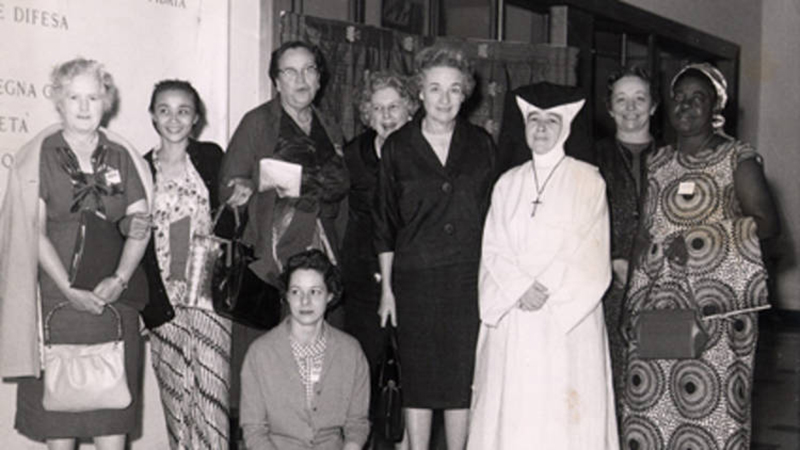
Neil Roper talks to Margaret Clark, President of the National Board of Catholic Women (NBCW), about the year of fundraising for CAFOD’s 60th anniversary and invites you to a quiz on Saturday May 7th at 7pm, raising money to support vulnerable Lebanese and refugee women.
Continue reading “Supporting Lebanese and refugee women”May 20, 2021
CAFOD welcomes the announcement of a ceasefire between Israel and Gaza, which we hope has brought a halt to the latest violence. Efforts must now go into addressing the underlying causes of injustice. CAFOD’s Senior writer, Mark Chamberlain, reflects on his trip to Gaza in 2015.
Continue reading “Reflections on the Israel and Gaza conflict”February 4, 2021
Everything that Nohad Al-Mir owned – including the house that she was born in – was destroyed in the massive explosions that shook Beirut last August. Six months on, she is slowly trying to piece her life back together.
Continue reading “Memories are all that remain in Beirut”November 23, 2018
Presenter and reporter Julie Etchingham travelled to Lebanon to see the work of CAFOD partner Caritas Lebanon.
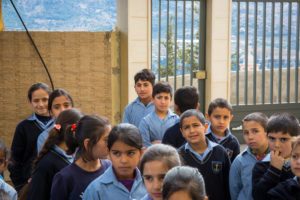 So I’m flying home early this morning after three eye-opening days in Lebanon – expertly guided by CAFOD and their partners on the ground Caritas Lebanon. As we wind slowly upwards away from Beirut, I’m thinking of all the children we met in the past few days.
So I’m flying home early this morning after three eye-opening days in Lebanon – expertly guided by CAFOD and their partners on the ground Caritas Lebanon. As we wind slowly upwards away from Beirut, I’m thinking of all the children we met in the past few days.
Help a refugee child. This charity gift will give much-needed emotional and educational support to children who have fled the violent trauma of war. Continue reading “Bringing childhoods back to life”
November 19, 2018
Presenter and reporter Julie Etchingham travelled to Lebanon to see the work of CAFOD partner Caritas Lebanon.
Thursday morning and we’re up before dawn to take the winding road to Mount Lebanon.
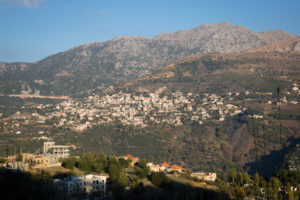
It’s a beautiful clear day as the sun comes up and we arrive at the home of a family of six refugees from Syria.
They’re living in a couple of rooms in a house which is still being built – but there’s a stove burning and the four children are happily pouring tea and having breakfast.
And even better – Hussein, 11, Mostafa, 10 and Amar who’s 6 are just about to put on their school uniforms.
Continue reading ““I want to be an engineer so that I can rebuild Syria””
November 16, 2018
Presenter and reporter Julie Etchingham travelled to Lebanon to see the work of CAFOD partner Caritas Lebanon.
It is Wednesday afternoon and we’re sitting on the floor of a shack covered in tarpaulin with eight year old Karim, where he’s been living with his family since fleeing Syria.
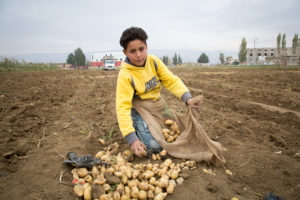
He was up at 6am this morning picking potatoes in the neighbouring field to bring in a few dollars a week for his family. He is a strikingly handsome young boy – bright eyed and smart – and he’s sick of having to work.
Help a refugee child Continue reading “Future? What do you mean by future?”
November 12, 2018
Presenter and reporter Julie Etchingham travelled to Lebanon to see the work of CAFOD partner Caritas Lebanon.
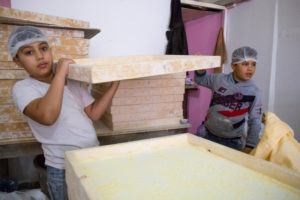
In a side road in a small town in the Bekaa Valley Yazan and Majed are hard at work. They are brothers aged 10 and 11. Their day started in darkness, getting up at 4am they were a bit scared to be going out before dawn, to get to their jobs in a local bakery.
The tiny bakery turns out flatbreads for local restaurants. The boys work alongside two grown men. The adults receive $40 (£30) a day. The boys get $3 (£2.30) a day between them. But these meagre earnings are vital for their family to survive after fleeing the war in Syria.
Donate to CAFOD’s Syria Crisis Appeal. Continue reading “The Child Breadwinners of Bekaa”
December 7, 2017
Richard Sloman is CAFOD’s Middle East Programme Officer. Here he reflects on his time in Lebanon where almost 40 per cent of the population are Syrian and Palestinian refugees. Richard visited one of Lebanon’s twelve Palestinian refugee camps – home to 450,000 people, one in ten of the country’s population.
Bourj el Barajneh in Beirut, Lebanon is one of the world’s oldest refugee camps. Established in 1948, it’s home to more than 31,000 people. These women, men and children live in just one square kilometre of land. That’s roughly 31 people for every square metre of earth.
Please give to CAFOD’s Advent appeal to help people living in poverty
Continue reading ““When they heard my Palestinian accent, they didn’t call back””
October 15, 2017
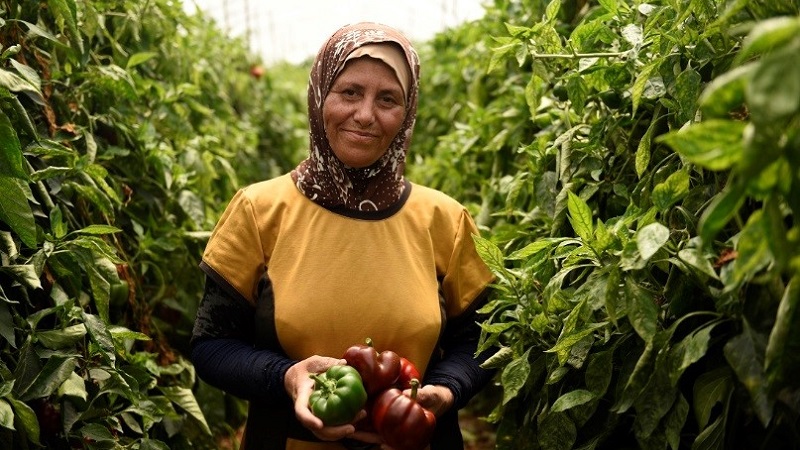
Olwen Maynard has been at CAFOD for over thirty years. While reviewing project files to see what’s worked and what didn’t, she’s often amazed to see the difference that’s been made to people’s lives. On the International Day of Rural Women, Olwen shares Karima’s story.
Thumbing through CAFOD’s file on the Workers Advice Centre (WAC) in Israel, I was most surprised to see we’ve been supporting their work now for ten years. Roni Ben-Efrat, one of the amazing Israeli women who got WAC started back in the 1990s, argues convincingly that lasting peace in the Middle East is impossible until all the people living there can make a decent living. Many Arab families in the area known as the Triangle, a remote and largely rural part of northern Israel, live below the poverty line. It’s not easy to find jobs at all, and it’s especially hard for housewives and mothers, almost all of whom left school without any qualifications. WAC requested support from CAFOD to help them move into paid employment, and we agreed.
Karima Yahya was in her early forties, with six children old enough not to need her constantly around, and a husband who’d undergone heart surgery and was no longer able to work. With no money coming in, they were sinking further and further into debt. Then she met Wafa Tiara.
Find out more about CAFOD’s work in Israel and the Occupied Palestinian territory
Continue reading “The fruit of her hands: Karima’s story from Israel”